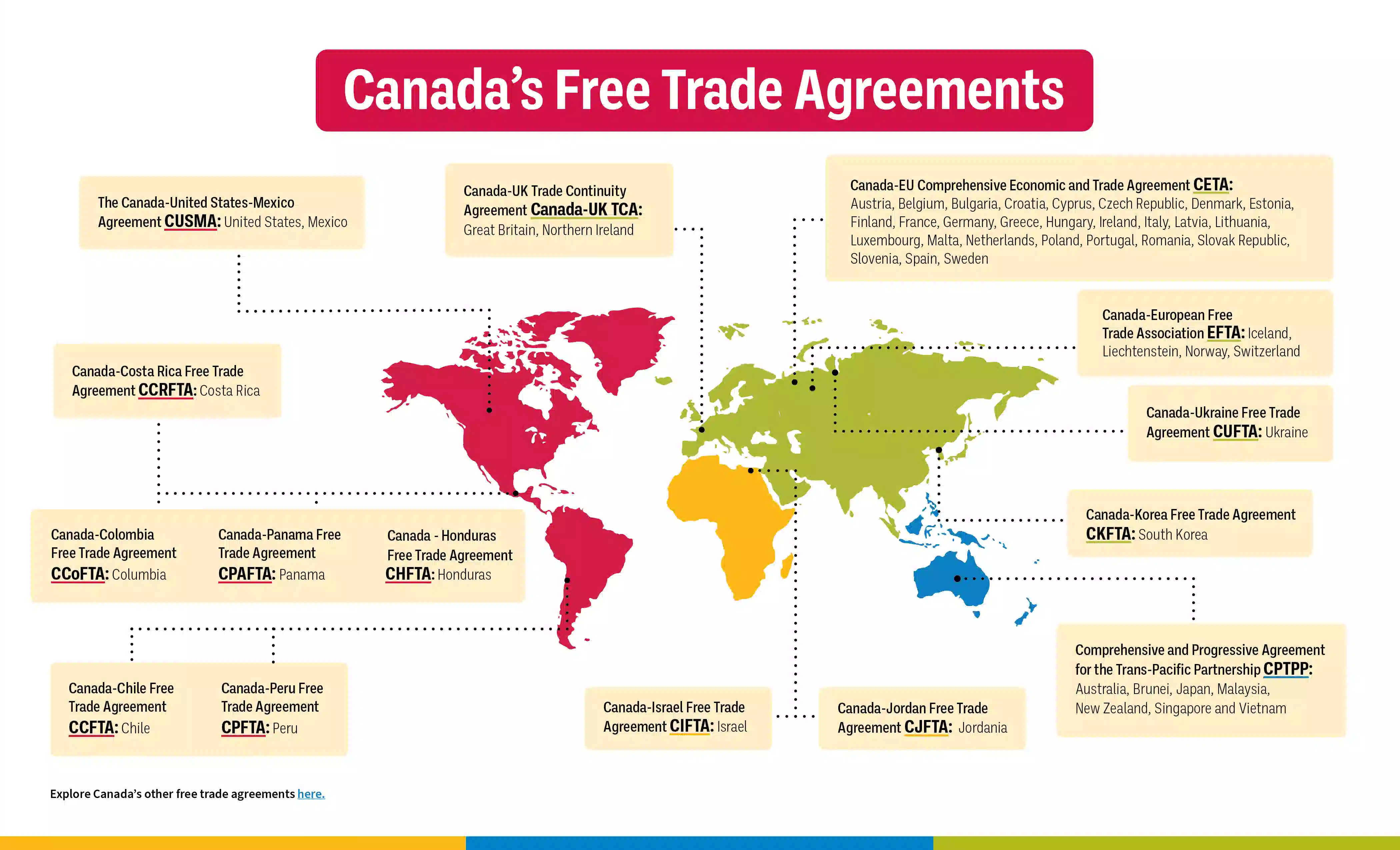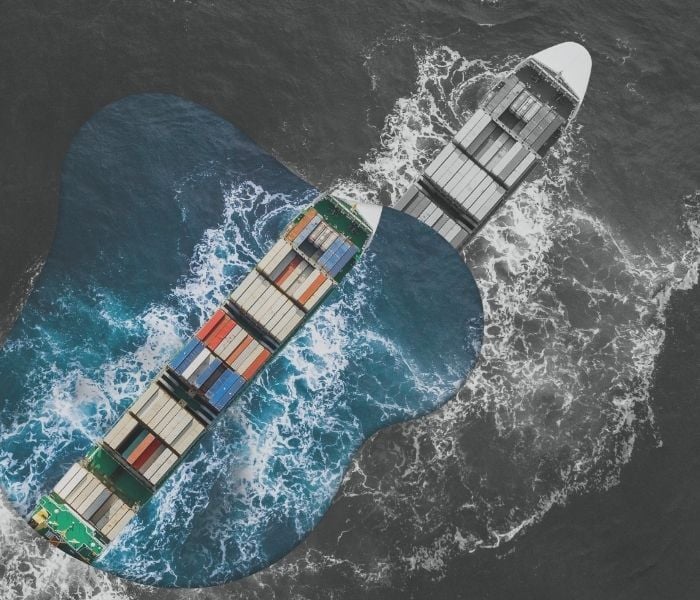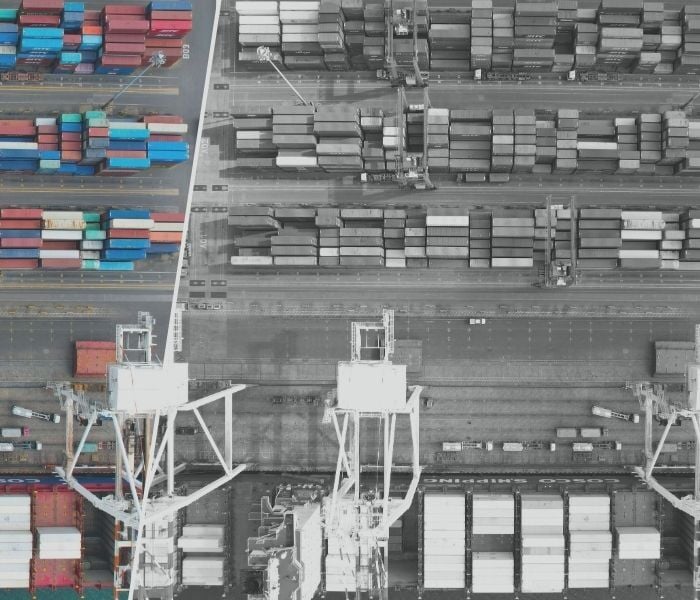Canada-U.S. Trade War
Date modified: 2025-11-17
Latest update: U.S. President Donald Trump reversed course this week, rolling back duties on more than 200 food-related products. While this doesn't impact the tariffs rates for Canada, it does help ease supply chain pressures for many Canadians given how closely we are tied to the US.
On this page:
- Overview of current U.S. tariffs
- Influence Canadian governments: Tell us how tariffs are impacting you
- Canada’s response
- Canada - U.S. tariffs - Key implementation dates
- CFIB’s advocacy efforts
- Download free “Proudly Canadian owned” poster
- Services and programs to support SMEs
- Frequently asked questions (FAQ)
Overview of U.S. tariffs
President Trump has announced new U.S. tariffs on wood products, including softwood lumber, upholstered wooden products, and kitchen and bathroom cabinets. The tariffs take effect October 14, with a 10% rate on softwood lumber and 25% on certain upholstered wooden products. Starting January 1, 2026, the rates will increase to 30% for upholstered products and 50% for kitchen cabinets and vanities from countries that don’t have a trade agreement with the U.S.
This action adds more tariffs on Canada, the largest supplier of softwood lumber to the U.S. On top of the existing anti-dumping and countervailing duties, this means Canadian softwood lumber exporters now face total tariffs of over 35%.
The U.S. is using Section 232 of the Trade Act to justify new tariffs on timber, lumber, and furniture, saying these imports could impact national security. This comes as the president awaits the Supreme Court’s ruling on his wider “reciprocal” tariffs, previously stopped by two lower courts.
Here are the current tariffs affecting Canadian exports into the U.S.:
- 35% tariff on all imports that don’t comply with the Canada-United States-Mexico Agreement (CUSMA) (effective April 2). What is considered CUSMA-compliant?
- 10% tariff on non-CUSMA compliant potash and energy products (effective April 2).
- 50% tariff on aluminum and steel imports from all countries into the U.S. (effective June 4).
- 25% tariff on all cars and trucks not built in the U.S. (effective April 2).
- 50% tariff on copper (effective August 1).
- 35% tariff on softwood lumber (effective October 14).
- 25% upholstered wooden products and kitchen/bathroom cabinets and vanities (effective October 14).
- Elimination of the U.S. de minimis treatment for low-value shipments. Goods valued at $800 or less are now subject to all applicable duties (effective August 29). What is de minimis treatment, and how does the Executive Order impact it?
- Goods transshipped to evade the 35% tariff will be penalized with a 40% tariff. For example, if a business tries to avoid the 35% tariff by shipping goods through another country first, the U.S. will penalize that action with an even higher tariff of 40%.
Other tariffs that were previously mentioned remain on the table, such as:
- Semiconductors, heavy trucks, pharmaceuticals, and films are also under consideration for tariffs, though no details have been provided on the timing or rates.
We’re committed to putting your voice front and center in all trade-related discussions. Tell us how U.S. tariffs are impacting your business – your input is crucial in shaping our advocacy efforts.
How is Canada responding?
Prime Minister Mark Carney is taking steps to ease trade tensions with the U.S. by eliminating Canada’s 25% tariffs on billions of dollars’ worth of American product. The change, effective September 1, targets a wide range of U.S. goods, but does not eliminate any sector-specific measures.
On September 5, Prime Minister Carney announced new measures aimed at protecting, strengthening, and transforming Canada’s strategic industries. See here for full details about the announcement.
A key measure announced for small businesses impacted by U.S., Chinese tariffs and Canadian counter-tariffs is the Regional Tariff Response Initiative (RTRI). This program varies by their administered Regional Development Agencies. Learn more on CFIB’s RTRI web page.
Canada has launched public consultations on the Canada-United States-Mexico Agreement (CUSMA). You can share your views until November 3.
Here are the current tariffs affecting U.S. imports into Canada:
- Effective September 1, Canada removed 25% tariffs on certain goods imported into Canada from the U.S. This includes removing tariffs on:
- Canada's tariffs on steel, aluminum, and automobiles remain in place.
- 25% tariff on all U.S. vehicles that don’t meet CUSMA requirements, in response to similar tariffs introduced by the U.S. (effective April 9). The Canadian tariffs will not apply to auto parts, recognizing the importance of the integrated North American production system, nor would they apply to vehicles from Mexico.
- 25% tariff on selected steel and aluminum products, covering $12.6 billion in steel and $3 billion in aluminum (effective March 13).
- Full list of U.S. products subject to counter tariffs as of September 1, 2025.
The federal government has also established a remission process for those seeking exceptional tariffs relief.
Tracking Provincial Countermeasures
In response to the U.S. tariffs, several Canadian provinces have implemented countermeasures:
AB
- Calling on provinces to reduce red tape and interprovincial trade barriers to bolster economic competitiveness.
- Doubled the contingency fund ($2 billion increase) in the 2025/26 provincial budget for possible response to U.S. tariffs.
Premier Smith announced that Alberta will:
- Procurement policy paused on April 17 in the "spirit of diplomacy"
- Help all Alberta grocers and other retailers with labelling Canadian products in their stores.
- Launch a “Buy Alberta” marketing campaign.
BC
- BC Liquor Distribution Branch is maintaining lists of removed US products and available Canadian ones for wholesale
- BC is requiring low-carbon biofuels that are added to our gasoline and diesel be produced in Canada instead of the U.S.
- BC has passed legislation granting cabinet the ability to impose tolls/fees on non-Canadian commercial vehicles using B.C. infrastructure such as highways, if needed, but has not done so.
- Procurement language has slightly shifted to:
- Exclude goods and services from U.S. suppliers and support Canadian companies and reliable trading partners from other countries instead
- Cancel existing U.S. contracts and non-essential subscriptions and software services where viable
- Avoid non-essential travel to the U.S.
MB
- Manitoba’s liquor authority (MBLL) will remove American products from liquor marts and will no longer buy American alcohol.
- Created a tariff hotline for questions, concerns, and feedback.
- Launched a Buy Local campaign.
- Prioritizing Canadian suppliers by amending the Government Purchases Act. Under the Buy Canadian Act, the province may give preferential treatment to Canadian suppliers when purchasing goods.
Find more on Manitoba’s response to U.S. tariffs webpage.
NB
- For impacted businesses: working capital loans of up to $5 million providing financial support to help maintain operations for tariff impacted companies.
- $40 million competitiveness and growth program to enhance the long-term sustainability of New Brunswick’s large export-intensive companies.
- $4 million to support the New Brunswick Fisheries Fund.
- Leveraging of existing $30 million strategic assistance budget funding to help mitigate the impact of tariffs, support contingency planning, market diversification and productivity improvements.
- For affected employees: flexible labour market support program that will provide support and services to those whose jobs have been affected by the tariffs.
- Promotion of the Business Navigator service for businesses with questions.
- Supporting New Brunswickers to buy local.
- Promotion of “NB Made”: tools for people to identify items made in the province.
- In support of Savour NB, Excellence NB, Eat Local NB and Buy Local for Good.
- Reviewing government procurement to suspend new contracts with U.S. companies, except for critical services that cannot be immediately replaced.
NFLD
- Promotion of the Business Navigators for businesses with questions.
- The Newfoundland Labrador Liquor Corporation (NLC) has pulled United States produced products from their shelves.
- Promotion of Buy NL.
- Review of U.S. procurement, stop it where possible.
- Working with federal and provincial governments to remove internal trade barriers.
NS
- Limiting access to provincial procurement for American businesses.
- Looking for opportunities to cancel existing contracts and will maintain the option to reject bids outright because of President Trump’s tariffs.
- Doubling the cost of Cobequid Pass tolls for commercial vehicles from the United States, effective Monday, February 3.
- Removing all alcohol from the United States from the shelves of the Nova Scotia Liquor Corporation effective Tuesday, February 4.
- Budget 2025/2026 set aside $200 million for a contingency fund to help the province deal with the economic impact of tariffs.
NWT
- Reviewing their procurement policies to eliminate purchases from U.S. companies where possible.
- Halting the Northwest Territories Liquor and Cannabis Commission’s purchase of American goods.
ON
- Ontario’s liquor authority (LCBO) is removing all U.S. alcohol from its shelves and ordering catalogue for restaurants and retailers.
- Cancelled the Ontario government’s $100 million contract with Elon Musk’s Starlink.
- Ban American companies from provincial contracts while U.S. tariffs are in place.
- Potentially stop nickel shipments to the U.S.
- Potentially include a 25% surcharge on Ontario energy exported to Minnesota, Michigan and New York, and possibly shut off Ontario power to these U.S. states.
- Plans to legislate a “Buy Ontario first, Canada second” procurement policy.
Tariff mitigation measures:
- A total of $3B in Employer Health Tax relief/more Workplace Safety and Insurance Board surplus funds to be returned to eligible businesses.
- $10B in cash-flow support for Ontario employers through a six-month deferral of provincial taxes.
- $5B for major industries through a new Protect Ontario Account to address operational challenges, restore supply chains, and restructure to find new customers and keep people employed.
- $120M in support for restaurants and bars by increasing the Liquor Control Board of Ontario wholesale discount from 10%-15%.
- $40M for a new Trade-Impacted Communities Program to support municipalities impacted by tariffs.
- $1.3B over three years expand the Ontario Made Manufacturing Investment Tax Credit to help lower costs for businesses that invest in buildings, machinery and equipment used for manufacturing or processing in Ontario.
- $600M for the Invest Ontario Fund to attract investment in advanced manufacturing, life sciences, and technology.
- Prioritize Ontario steel and forestry for provincial projects, purchase Ontario-made vehicles for government use, and help local innovators access more government procurement opportunities – and urge municipalities to do the same.
- Urge the federal government to fairly and quickly distribute retaliatory tariff revenue to impacted workers and businesses.
- Enhance termination and severance rights for workers affected by tariff layoffs and closures.
PEI
- Removing US liquor in retail stores, bars, restaurants.
- Export diversification fund of up to 60% ($32K max) of expenses (such as trade show expenses, marketing, etc.)
- Review of procurement process to identify alternatives.
- Tariff Working Capital Program: Business loan to affected industries (details to be available later).
- Doubling global trade missions organized for export diversification.
- Export Enhancement and Diversification Fund
The Export Enhancement and Diversification Fund helps Prince Edward Island exporters and export-ready businesses with marketing and trade costs to execute export plans and activities to explore new global export opportunities to diversify and enhance their business.
QC
Premier François Legault announced key measures, including:
- Removing U.S. alcohol from Quebec’s liquor authority (SAQ) shelves and stopping supplying U.S. alcohol to grocery stores, agencies, bars and restaurants.
- Establishing a unit that will explore market diversification options for the forest industry in Quebec.
- $20M to train workers in affected sectors.
- Financial assistance program (FRONTIERE) to help companies in the manufacturing or a primary sector subject to U.S. tariffs.
- Chantier productivité - increasing financial assistance through interest-free repayable loans, as well as potential non-repayable contributions for companies with productivity-focused investment projects over $10M.
- Penalties of up to 25%, effective immediately, on bids from American companies that participate in public calls for tender without having establishments in Quebec or with its commercial partners.
- Program (PANORAMA) to help companies export outside de U.S.
- Up to $8M to provide tailored training for businesses looking to rapidly expand into new markets.
- Introducing Bill 112, An Act to facilitate the trade of goods and the mobility of labour from the other provinces and the territories of Canada. To learn more, read our press release on the matter (in French only).
SK
- Saskatchewan’s government will prioritize Canadian suppliers when procuring goods and services, with the goal of reducing or eliminating U.S. suppliers.
- Paused all capital projects as they ask contractors to report on American products/projects and reduce the amount.
- All pipelines that go through Saskatchewan are now considered pre-approved. Despite this, all cross-provincial pipelines must still be reviewed by the Canadian Energy Regulator.
YK
- Directing the Yukon Liquor Corporation to stop purchasing beer, wine and spirits from the U.S. Stores may continue to sell products they already have in stock.
- Reviewing territorial government procurement policies to exclude U.S. companies and minimize the purchase of U.S. goods and services, wherever possible.
- Allocating $1 million to develop an assistance program, complementary to federal support programs, to help Yukon businesses adapt to the uncertain economic environment created by these tariffs. This program will be introduced and funded through budget 2025-2026.
Canada - U.S. tariffs – Key dates
| Date | Target Country/Item | Rate |
|---|---|---|
| March 4 | Canada and Mexico | 25% on all goods entering the US; 10% on Canadian energy |
| March 4 | U.S. (Canada's Phase 1 counter tariffs) | 25% on a $30B selection of US goods entering Canada |
| March 6 | CUSMA-compliant pause | U.S. pauses tariffs on CUSMA-compliant goods |
| March 12 | Aluminum and Steel | 25% on all aluminum and steel entering the U.S. |
| March 13 | U.S. (Canada's special counter tariffs) | 25% on aluminum, steel and additional US goods entering Canada |
| April 2 | Canada and Mexico | 25% tariff on all imports that don’t comply with CUSMA, 10% tariff potash and energy that don’t comply with CUSMA, 25% tariff is kept on steel and aluminum, and 25% tariff on all cars and trucks not built in the U.S. |
| April 2 | U.S. “Liberation Day tariffs” (with nearly 200 countries) | 10% baseline tariff applied to all countries, with additional tariffs imposed based on the trade deficit with each specific country. |
| April 9 | U.S. (Canada’s counter tariffs on vehicles) | 25% matching tariffs on all U.S. vehicles that don’t comply with CUSMA. |
| May 28 | Removal of “Liberation Day tariffs” and “fentanyl-related” tariffs on Canada and Mexico | Court of International Trade issued a ruling that found President Trump overstepped his authority in imposing across-the-board tariffs. |
| May 29 | Reinstate “Liberation Day tariffs” and “fentanyl-related” tariffs on Canada and Mexico | The federal appeals court announced it is blocking the Court of International Trade's injunction, which means the tariffs are reinstated. |
| June 4 | Aluminum and Steel | Increased from 25% to 50% on all aluminum and steel entering the U.S. |
| August 1 | Copper | 50% on all copper entering the U.S. |
| August 1 | Canada | 35% tariff on all non-CUSMA compliant imports (up from the current 25%) |
| August 29 | Elimination of the U.S. De minimis for low-value shipments. | Goods valued at $800 or less are now subject to all applicable duties. |
| September 1 | Canada's counter-tariffs | Elimination of Canada’s counter-tariffs on U.S. goods |
| October 14 | Softwood lumber and wood products | U.S. imposes 10% tariff on softwood lumber and a 25% tariff on certain upholstered wooden products |
| January 1 | Softwood lumber and wood products | U.S. will increase tariffs to 30% on upholstered wooden products and 50% on kitchen cabinets and vanities from countries without a trade deal |
CFIB's advocacy efforts
We’re actively working with governments to minimize the impact of U.S. tariffs on your business. Our efforts include:
- Sharing the views of SMEs with all levels of government through:
- Collecting data on small business concern surrounding tariffs data in December 2024.
- First letter sent to governments in January 2025.
- Collecting additional data through a dedicated tariff survey. Presented this data to key trade officials from all provincial and federal governments through a government stakeholder briefing. See here for results.
- Second letter sent to governments sharing the key findings of CFIB’s trade survey.
- See here our work on reducing internal trade barriers.
- CFIB is calling on government to release the money that has been collected by Canada’s retaliatory tariffs. See letter here.
- Curious about how small businesses are coping with tariffs and trade disruptions? Here’s what Canadian SMEs are telling us about the Canada–U.S. trade war.
- The federal government has created:
- A fact sheet and a key messages document on Canada’s shared border and trade.
- Resources and supports document for businesses.
Services and programs
Tariffs and international trade can be complex. Here are federal government services and programs that can assist you
| Trade Commissioner Service | Business Development Bank of Canada | Export Development Canada | Farm Credit Canada | Employment and Social Development Canada |
|---|---|---|---|---|
|
The Trade Commissioner Service (TCS) offers Canadian businesses funding and support programs, international opportunities, and access to their global network of trade commissioners in over 160 cities. TCS resources:
|
Business Development Bank of Canada (BDC) provides financing solutions and advice to businesses of all sizes, industries, and at every stage of growth. $500 million available in favourably priced loans through the Business Development Bank of Canada to support businesses in sectors directly targeted by tariffs, as well as companies in their supply chains. Businesses will also benefit from advisory services in areas such as financial management and market diversification. |
Export Development Canada (EDC) helps Canadian companies of all sizes succeed in global markets by providing trade knowledge, financial solutions, insurance, equity, and critical connections. Trade Impact Program: $5 billion over two years, starting this year, to help exporters reach new markets for Canadian products and help companies navigate the economic challenges imposed by the tariffs, including losses from non-payment, currency fluctuations, lack of access to cash flows, and barriers to expansion. |
Farm Credit Canada (FCC) offers a variety of financial products and services tailored to small businesses in the agriculture and agri-food sectors. $1 billion available in new financing through Farm Credit Canada to reduce financial barriers for the Canadian agriculture and food industry. This lending offer will help address cash flow challenges so that businesses can adjust to a new operating environment and continue to supply the high-quality agricultural and food products that Canadians rely on. |
ESDC’s Work-Sharing Program helps avoid layoffs when businesses experience a temporary decrease in normal business activity that is beyond the control of the employer. |
Additionally, the federal government is taking steps to mitigate the economic impacts of potential tariffs, such as:
- Establishing a remission process to assess requests for exceptional tariff relief.
- Defer corporate income tax payments and GST/HST remittances from April 2 to June 30, 2025, providing up to $40 billion in liquidity to businesses.
- Make enhancements to AgriStability benefits to provide additional support to agricultural producers in light of trade disruptions with the U.S. and China.
Provincial government services and programs that can assist you
| BC | BC’s Export Navigator portal: CUSMA Compliance Advisory Services Initiative (CCASI) – up to $5,000 in reimbursements for exporters to the U.S. Country trade profiles for selected countries, regions and all U.S. states Trade and Invest BC: Export Programs for BC Businesses |
|---|---|
| SK | Saskatchewan Trade and Export Partnership (STEP) (In partnership with SK Gov): Saskatchewan Trade & Export Partnership (STEP) « Prosperity through trade » STEP is a member-driven, non-profit organization that’s committed to increasing Saskatchewan’s export activities. They link Saskatchewan suppliers with the global marketplace. |
| MB | Export Support Program: Export Support Programming provides financial assistance to Manitoba SME’s enterprises to participate in trade shows or missions outside of the province, with the goal of expanding existing or entering new export markets. |
| ON | Please visit our Ontario election Promise Tracker for trade-related and other Party promises. |
| NS | A Guide to Invest Nova Scotia’s Programs and Resources |
| NFLD | The Business Investment Program: Business Investment Program provides term loans to small and medium-sized enterprises (SMEs) in strategic growth sectors. The fund is also available to businesses which have export potential and require assistance to enter or expand in external markets. |
| YK |
The Economic Development Fund: Trade Resilience Program: $1 million Trade Resilience Program, created to support Yukon businesses facing challenges caused by U.S. trade decisions and Canadian countermeasures. The program also funds projects that help the Yukon economy adapt to these changing trade conditions. |
Frequently Asked Question
What are tariffs?
Tariffs are taxes imposed on goods as they cross international borders, typically calculated as a percentage of the imported good's total value.
Exporting Canadian goods to the U.S.
What is considered CUSMA-compliant?
Under CUSMA, Canadian exports must meet "rules of origin" requirements to qualify for tariff-free access. Goods that are grown or harvested in Canada are automatically compliant. However, manufactured products must meet specific criteria to qualify. To avoid the certification process, many businesses choose to pay the "Most Favoured Nation" (MFN) tariff, which has recently increased from 2.5% to 25% for certain goods, and as of August 1, the U.S. has increased this tariff from 25% to 35 %.
Please refer to CBSA’s “ how to certify the origin of goods” for more information.
If my business has a U.S. holding company or a U.S. subsidiary, am I still subject to U.S. tariffs?
Yes, even if your business has a U.S. holding company or a U.S. subsidiary, you may still be subject to U.S. tariffs.
Why are U.S. tariffs being imposed on Canadian goods?
Initially, the U.S. administration claimed tariffs were necessary to address the flow of illegal drugs, particularly fentanyl, and illegal immigration, which it considers significant threats to national security. The president has also highlighted the trade deficit between the U.S. and Canada as a reason for the tariffs.
To avoid the initial implementation date of February 4th, a deal was reached to delay the tariffs by one month after Canada and Mexico agreed to introduce new border security measures that addressed U.S. concerns. Canada has invested in increased enforcement at the border in an effort to satisfy the U.S. and prevent economic penalties.
At this time, it remains unclear what additional steps Canada may need to take to permanently remove the threat of tariffs. While the initial agreement focused on border security, President Trump has suggested he is seeking broader economic concessions.
How will U.S. tariffs impact my pricing and sales in the U.S.?
If your goods are “CUSMA-compliant”, they qualify for tariff-free access. Goods that do not meet CUSMA requirements are subject to a 35% tariff. These tariffs are typically paid by the importer to U.S. Customs and Border Protection (USCBP).
What is de minimis treatment, and how does the Executive Order impact it?
De minimis treatment allowed for low-value imports (under $800) to enter the U.S. without being subject to tariffs or duties. De minimis treatment has been eliminated, effective August 29. See White House Executive Order for more details.
How can the US impose tariffs when CUSMA is in effect?
While CUSMA eliminates most tariffs on goods traded between Canada, the U.S., and Mexico, it does not prevent the application of certain tariffs outside the agreement. In fact, CUSMA includes a clause on essential security, which states that nothing in the agreement precludes any of the parties from applying measures that it considers necessary for the fulfilment of its obligations with respect to the maintenance or restoration of international peace or security, or the protection of its own essential security interests.
For this reason, the U.S. can impose tariffs national security reasons.
Will tariffs apply to services?
No, tariffs are taxes imposed on physical goods as they cross the border. They do not apply to intangible property, such as software or technology licenses, or to cross-border services.
Importing U.S. goods into Canada
Is my business eligible for remission as of April 16?
Your business may be eligible under the new Remission Order if it imports goods from the U.S. for any of the following purposes in Canada:
- Manufacture or processing of any good or the packaging of a food or beverage, this includes beer and wine (special authorization code 25-0466C).
- Public health, public safety (e.g., police, fire, ambulance), and National Security (special authorization code 25-0466A).
- Health care services, including dental and long-term care (special authorization code 25-0466B).
- Specific products such as infant formulas, nutrition formulas, medical compression garments, among others (special authorization code 25-0466D).
The Order provides relief for goods imported into Canada for a 6-month period, from April 16 to October 15, 2025, and retroactively for goods imported since March 4. Remission can be claimed to waive the payment of tariffs at the time of importation, and importers may seek a refund for tariffs already paid. Further details on the Remission Order can be found in the CBSA Customs Notice 25-19: United States Surtax Remission Order (2025).
To apply for remission, you must enter a Special Authority OIC field (e.g., 25-0466A, 25-0466B, etc.) on your Commercial Accounting Declaration (CAD) form. This can be submitted via the CARM Client Portal (CCP).
I sent a remission request, when can I expect a response?
Unfortunately, the Department of Finance was unable to specify a review timeframe due to the unprecedented volume of requests and the multiple procedural steps involved. Each remission request is evaluated on a case-by-case basis by the Department of Finance, which may require to consult other stakeholders. Any approved remission must receive the Minister of Finance’s sign-off and final approval from the Governor in Council before taking effect. Once your request is assigned to an analyst, they will contact you directly to verify all application details.
Is CBSA ready to collect tariffs, and has the process changed?
The Canada Border Services Agency (CBSA) is fully prepared to collect tariffs, and the process remains unchanged. Tariffs will continue to be administered through the CBSA Assessment and Revenue Management (CARM) system, following the same procedures as before. Importers should declare goods as usual, ensure compliance with CBSA regulations, and pay any applicable surtaxes through CARM or their customs broker. Learn more on our CARM is here webpage.
Other frequently asked questions
What has Canada done to strengthen the border?
Canada has invested over $1 billion in new equipment and security measures to combat drug trafficking and illegal immigration, which aims to address U.S. concerns and avoid Trump’s tariffs. Specifically, Canada has increased investment in technology (such as, new drones and helicopters), increased personnel, and enhanced intelligence sharing. The government has also introduced new policies and programs to improve security and efficiency. Despite these investments and efforts, Trump is proceeding with tariffs, stating that Canada hasn't done enough.
See here for more detail on Canada’s Border Plan.
How much of U.S. drug and immigration issues are linked to Canada?
According to U.S. and Canadian government data:
- Less than 1% of fentanyl entering the U.S. comes from Canada.
- Over the past two years, about 6% of illegal immigrants at the U.S. border were stopped at our border.
If my business exports goods to Mexico, but they are shipped through the U.S., will they be impacted by tariffs?
No. Goods that are simply transiting through the U.S. on their way to Mexico should not be impacted by tariffs. As long as the goods do not undergo any changes or enter U.S. commerce, they are not subject to the U.S. tariffs. However, if the goods are processed or enter the U.S. market before continuing to Mexico, they may be subject to the applicable tariffs.
Which countries have completed a trade deal with the U.S.?
While several countries have announced preliminary trade agreements with the U.S., none of these deals have been finalized or officially implemented. As of now, the agreements are still under negotiation, and details have yet to be confirmed in writing.
Below is a list of countries with announced preliminary deals and their corresponding tariff rates under the new U.S. trade framework:
| Country | Date Announced by President Trump | Tariff Rate |
|---|---|---|
| U.K. | May 8, 2025 | 10% |
| E.U. | July 28, 2025 | 15% |
| Japan | July 22, 2025 | 15% |
| South Korea | July 30, 2025 | 15% |
| Philippines | July 22, 2025 | 19% |
| Indonesia | July 15, 2025 | 19% |
| Vietnam | July 2, 2025 | 20% |
| India | July 30, 2025 | 25% |
Source: CBC News, Canada 'disappointed' by Trump boosting tariffs to 35%, says Carney. July 31.
What is the elimination of de minimis treatment for China?
The de minimis rule allows low-value imports (valued at or under $800) to enter the U.S. duty-free. However, under a new Executive Order, this exemption will no longer apply to goods from the People’s Republic of China (PRC) and Hong Kong, effective May 2, 2025, at 12:01 a.m. EDT. As a result, all covered goods from these regions will now be subject to applicable duties and tariffs. The new policy applies to all imported goods valued at or under $800 that would have otherwise qualified for the de minimis exemption. This includes shipments arriving through private carriers (e.g., couriers, freight forwarders) as well as postal shipments.
For shipments arriving through the international postal network:
- Starting May 2, 2025, items containing goods valued at or under $800 will be subject to a duty of either 30% of their value or $25 per item, whichever is greater.
- After June 1, 2025, the per-item duty will increase to $50.
- These duties replace any other previously imposed tariffs or duties on affected goods.
This policy is currently targeting goods from China and Hong Kong. Imports from other countries that qualify for the de minimis exemption will continue to receive duty-free treatment.
Is my business eligible for the Work-Sharing program?
Work-Sharing is an agreement between employers, employees and the Government of Canada (Service Canada). The Work-Sharing Program helps employers and employees avoid layoffs, when there is a temporary decrease in the normal level of business activity that is beyond the control of the employer.
The Government of Canada has introduced special measures to better support employers and their employees in the wake of U.S. tariffs threats. These special measures, including expanded employer and employee eligibility, are in effect from March 7, 2025, until March 6, 2026.
Eligibility has been expanded:
- to businesses that have been in operation in Canada for 1 year
- to include non-profit and charitable organizations experiencing a reduction in revenue levels as a direct or indirect result of the tariffs
- to include cyclical or seasonal employers
- to employers experiencing a decrease in work activity over the past six months of less than 10% and allowing utilization of Work-Sharing to exceed 60%
- to employees who are not year-round, permanent, full-time or part-time employees, specifically seasonal or cyclical employees
- to employees assisting the employer recovery efforts
For more on the Work Sharing program, please visit this webpage.
Where are Canada’s other Free Trade Agreements (FTAs)?
Canada has 15 free trade agreements (FTAs) covering 51 countries1. These agreements provide Canadian businesses with preferential market access, reduced tariffs, and stronger trade rules. Here’s an overview of some of Canada’s key FTAs:

For more information, check out these resources:
Be part of the largest small business organization in Canada.
Join more than 100,000 successful independent businesses who benefit from personalized advice, exclusive savings and a strong voice in government.

















